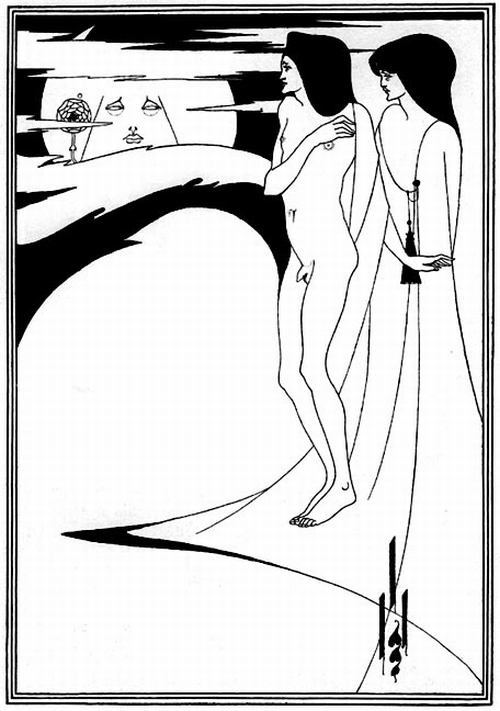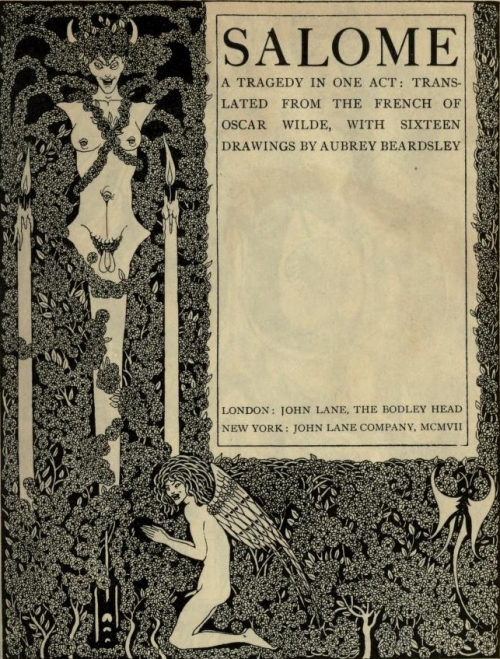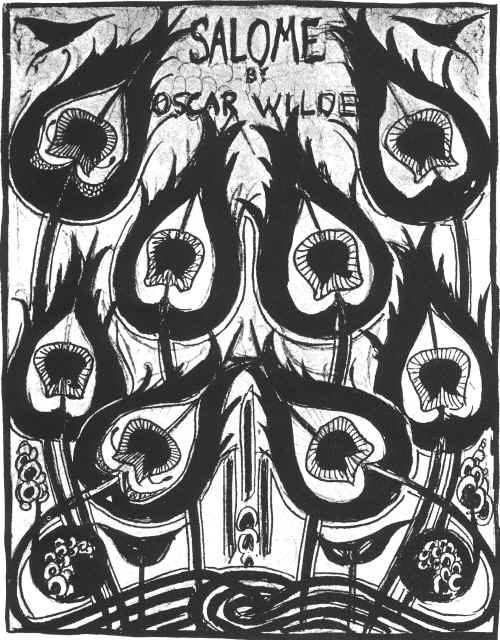SALOMÉ
A TRAGEDY IN ONE ACT:
TRANSLATED FROM THE FRENCH OF
OSCAR WILDE,
WITH SIXTEEN DRAWINGS BY AUBREY BEARDSLEY
LONDON: JOHN LANE, THE BODLEY HEAD
NEW YORK: JOHN LANE COMPANY, MCMVII
THE PERSONS OF THE PLAY.
HEROD ANTIPAS, TETRARCH OF JUDÆA.
JOKANAAN, THE PROPHET.
THE YOUNG SYRIAN, CAPTAIN of the GUARD.
TIGELLINUS, A YOUNG ROMAN.
A CAPPADOCIAN.
A NUBIAN.
FIRST SOLDIER.
SECOND SOLDIER.
THE PAGE OF HERODIAS. JEWS, NAZARENES, ETC.
A SLAVE.
NAAMAN, THE EXECUTIONER.
HERODIAS, WIFE OF THE TETRARCH.
SALOMÉ, DAUGHTER OF HERODIAS.
THE SLAVES OF SALOMÉ.
A NOTE ON "SALOMÉ."
"SALOMÉ" has made the author's name a household word wherever theEnglish language is not spoken. Few English plays have such a peculiarhistory. Written in French in 1892 it was in full rehearsal by MadameBernhardt at the Palace Theatre when it was prohibited by the Censor.Oscar Wilde immediately announced his intention of changing hisnationality, a characteristic jest, which was only taken seriously,oddly enough, in Ireland. The interference of the Censor has seldom beenmore popular or more heartily endorsed by English critics. On itspublication in book form "Salomé" was greeted by a chorus of ridicule,and it may be noted in passing that at least two of the more violentreviews were from the pens of unsuccessful dramatists, while all thosewhose French never went beyond Ollendorff were glad to find in thatvenerable school classic an unsuspected asset in their education—ahandy missile with which to pelt "Salomé" and its author. Thecorrectness of the French was, of course, impugned, although the scriphad been passed by a distinguished French writer, to whom I have heardthe whole work attributed. The Times, while depreciating the drama, gaveits author credit for a tour de force, in being capable of writing aFrench play for Madame Bernhardt, and this drew from him the followingletter:—
The Times, Thursday, March 2, 1893, p. 4.
MR. OSCAR WILDE ON "SALOMÉ."
To the Editor of The Times.
Sir, My attention has been drawn to a review of "Salomé"which was published in your columns last week. The opinionsof English critics on a French work of mine have, ofcourse, little, if any, interest for me. I write simply toask you to allow me to correct a misstatement that appearsin the review in question.
The fact that the greatest tragic actress of any stage nowliving saw in my play such beauty that she was anxious toproduce it, to take herself the part of the heroine, tolend to the entire poem the glamour of her personality, andto my prose the music of her flute-like voice—this wasnaturally, and always will be, a source of pride andpleasure to me, and I look forward with delight to seeingMme. Bernhardt present my play in Paris, that vivid centreof art, where religious dramas are often performed. But myplay was in no sense of the w
...BU KİTABI OKUMAK İÇİN ÜYE OLUN VEYA GİRİŞ YAPIN!
Sitemize Üyelik ÜCRETSİZDİR!


